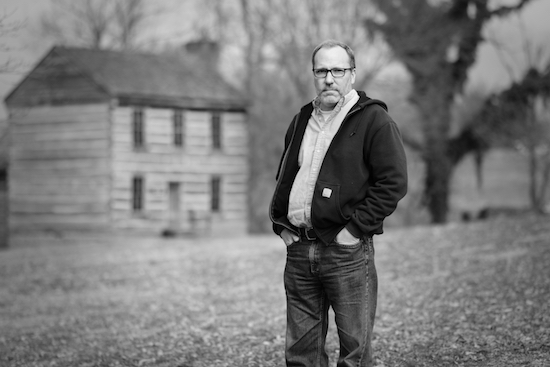Author portrait by Steve Cody
Abraham Lincoln is an American secular icon. His image – and the very idea of him that this image has come to represent – permeates American culture. That he is the subject of over one thousand pieces of music, the protagonist of countless major poems, novels, films, plays and paintings should not be regarded as surprising as he was enshrined in word and image even before his assassination in 1865. For him to die so abruptly after shepherding the States through the American Civil War, the preservation of the Union and the success of the Emancipation Proclamation freeing 3.5 million enslaved African Americans, guaranteed him something close to immortality. Where Walt Whitman led with the elegiac poem ‘Oh Captain! My Captain!’ in 1865, many other artists would follow. No, what is remarkable, is not that Lincoln is remembered with such frequency but how this amassed body of art suggests a near universal sense of undimmed fondness.
Whether the example of his intersection with popular culture is sublime (George Saunders’ experimental novel Lincoln In The Bardo) or ridiculous (the self-explanatory Epic Rap Battles Of History: Chuck Norris vs Lincoln); whether he is the subject of serious art (Aaron Copeland’s 1965 work A Lincoln Portrait which sets the former president’s speeches such as ‘The Gettysburg Address’ to classical music has been narrated by Bill Clinton and Barack Obama) or not so serious art (each episode of Police Squad! featured Rex Harrison as Lincoln, drawing a gun and firing on John Wilkes Booth) it’s obvious that, to most, Honest Abe remains both national treasure and folk hero. (An entire academic research project could be carried out into the sheer volume of films, books, TV shows etc. where the narrative hinges on attempts to foil the assassination of the 16th President of the US – many by the means of time travel.)
The latest in a long line of artists to don the black stove pipe hat and Shenandoah beard, is Pulitzer Prize nominated poet, Maurice Manning. His new collection Railsplitter (which is published by Copper Canyon Press in October) is written from the narrative point of view of Lincoln. Manning is, if not an outright nature writer, a rural-based poet of place at least. He lives on a farm in Kentucky and teaches poetry at nearby Transylvania University, Lexington.
So if you’re thinking that maybe this 52-year-old wordsmith lies somewhere in the sublime/serious quadrant on the Portrayals Of Lincoln In Popular Culture graph, that you’re now imagining, you’d be right, partially. A quick scan of the Railsplitter index however reveals that it contains a poem entitled ‘A Brief Refutation of the Rumor That I Allowed Willie and Tad to Relieve Themselves in My Up-Turned Hat on a Sunday Morning at the Office while Their Mother Was Attending Religious Services’, which suggests that perhaps the full picture is slightly more complex.
To be precise, the voice of Railsplitter is that of Lincoln calling out from beyond the grave, recalling events (ranging from the trivial to the momentous) selected from the entire span of his life, so it runs the whole gamut from serious/sublime to ridiculous/funny; the wide prairie-like expanse of ground covered (not to mention style and tone) reveals that the book is more about the nature of poetry itself and what it can achieve than it is about historical record.
I spoke to Maurice Manning on Skype recently in order to learn more about this new book and also his deep connection to the Kentucky countryside. (And if you will indulge this swift digression: I’d like to now give praise to the – mainly – serious and sublime poets of this world, for they take great care to speak in full, elegant and precise sentences when asked questions, while also indulging in vast pauses before answering them: a heavenly treat for the writer trapped in the purgatory of transcription.)
Manning talks of Lincoln as having been a “figure sitting on my shoulder for many years”. His second collection of poetry (A Companion For Owls, published in 2004) was written in the voice of Daniel Boone, the American pioneer woodsman folk hero. He explains: “He was a figure associated with Kentucky history, and I thoroughly enjoyed writing that work. Even back then, nearly 20 years ago, it was clear that at some point in my life I would have to take on Lincoln. I knew even then what an intimidating prospect that would be.”
Railsplitter is one of Honest Abe’s less enduring nicknames. The Kentucky of Lincoln’s childhood was heavily forested. Settlers needed to clear land in order to establish farms and if they had livestock, they would then need to enclose it. Manning explains: “One method of enclosure, because of a lack of other materials, was to take a felled tree and to split it into rails, which would then be criss-crossed and would hold each other up in a zig-zag pattern.
"It was terribly physical work but Lincoln was a very strong young man and gained a reputation as being very capable when it came to splitting rails out of these larger logs.”
When Lincoln first ran for presidency, the name was useful with all of its associations of strength and pioneer spirit. Manning adds: “But the term must have been applied somewhat figuratively. There were many political factions at that time and he was the person who could split them and build a new coalition out of these various factions.”
Manning started the project in 2016, deciding from the outset to find an unconventional approach: “I decided to have him speak and think and reflect from a posthumous perspective, from a kind of nowhere state. In my intuitive thoughts, I saw Lincoln as a figure who looks over American history and American consciousness as a somewhat ghostlike figure. We are certainly haunted by the way he died and by the way he presided over our country during its most destructive and disturbing chapter of history.”
Research for the collection was selective purely because it had to be: “When beginning the project I was confronted with the fact that there are more books written about Lincoln than any other figure in American history. I was aware that I could spend the rest of my life researching it if I wanted.” He restricted himself to just two mainstream biographies but read everything he could find that Lincoln himself had written from speeches to private correspondence.
After immersing himself in Lincoln’s compositional rhythms, the next step was to conduct some altogether more earthy and psychogeographical research: “I realised that the best thing I could do – and this connects to any other work that I’ve done – was simply to put my feet on the ground and be where he was. And [my family and I] are fortunate in that we live in Washington County, in Kentucky, where Lincoln’s parents met and were married. It’s where his father’s family first settled.
“His family probably came through the Cumberland Gap with Daniel Boone in the 1780s. I went to the farm in Southern Indiana where his family relocated when he was an adolescent. And then I went to central Illinois where the family finally landed and where Lincoln’s mature life began.
“Yes, I read about him and read everything he wrote – hearing his words in my inner ear, gave me a sense of his rhythm of thought and rhythm of being – and I connected that with the landscapes that he occupied. And I thought, ‘Let’s see what will come of it!’”
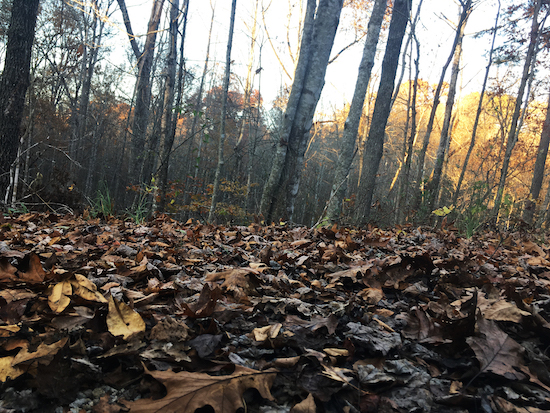
Railsplitter is an endlessly inventive book and as its subtitle [Reflections On The Art Of Poetry Composed In The Posthumous Voice Of Honest Abe Lincoln, Former Pres., US] suggests, it’s as much meta-exploration of the modern role of poetry in the here and now itself than collection of artfully constructed period verse.
If Abe Lincoln offers a sturdy enough cultural, historical and political framework for creative people to hang their art off in general terms, it’s easy to see why he’s an attractive subject to poets in particular. For starters, he was a poet himself. Just prior to his career in politics, while he was a prairie lawyer in the 1840s, he tried his hand. (In 1846, The Quincy Whig also published a short story of his called ‘A Remarkable Case Of Arrest For Murder’, which was loosely based on a case he himself defended.)
Manning is politic about the quality of the 16th president’s verse: “He published two poems anonymously in a newspaper that happened to be abolitionist. Lincoln’s poems were fairly conventional. They could be described as sentimental. He stalled out as a poet after that. I don’t know if he realised that his talent for it was not terribly developed or that he had more practical things to attend to. I’d imagine it was a bit of both.”
Despite this Manning describes him as “our most literary president”. He explains: “Lincoln loved poetry. He memorised many, many poems by the likes of Robert Burns and Edgar Allen Poe. In times of personal and national crisis he would recite passages from the plays of Shakespeare. He did this to clear his practical mind and I find that really deeply moving.”
Untypically he doesn’t pause for a second when I ask him if there has been a truly literary president during his lifetime: “Barack Obama. Famously he said that every night he was in the White House he read literature of all kinds. I think I have it right when I say that he acknowledged Lincoln as a role model for this practice.
“Reading good writing clarifies one’s thoughts. A good book can comb through your own thoughts and untangle them and I would say that President Obama and Lincoln shared a value for eloquence; that if something is clearly and eloquently articulated then that is valuable to the public. People want to hear what is true; they want to hear an accurate description of a particular situation and want to know that a leader can put it all into effective language.”
In the same way that good science fiction is often more likely to be a satirical critique of the age the author lives in than a piece of sheer escapism or genuine attempt at future divination, writers who tackle political figures can often have much more contemporary matters in mind. And given that Lincoln is, to many, the epitome of a great American president – one who presided successfully over a country that was horrifically divided along racial and geographic lines in an era of great change – there’s a particular elephant in the room that needs to be addressed in the case of Railsplitter.
Manning, to his credit, doesn’t sidestep the issue: “Yes, you’re exactly right about this and I agree with you. I began digging in to the basic material for the book in the Fall of 2016, not knowing what was about to happen in our country. [Donald Trump assumed office as the 45th POTUS on January 20, 2017.]
“I sat down to write the actual poems at the end of January 2017 and I tried my best not to use this as an occasion to scold our present moment because I didn’t want there to be an overt dialogue between 1860 and 2017. However, I found that by sticking as carefully as I could to the historical record of Lincoln’s time, that on its own made all kinds of commentary about our president and the present moment.
“I didn’t have to put a heavy hand on it at all because the parallels between American history of the mid-1850s through the end of Lincoln’s life are uncannily similar to the last few years of American history. I didn’t have to offer my own commentary on this, I just had to shine a light on to history.”
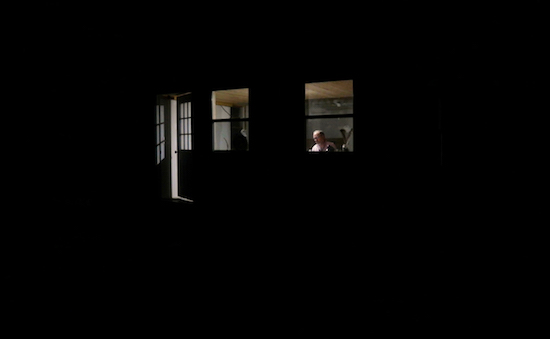
Born in 1966, Maurice Manning’s ties to rural Kentucky predate his career as a poet. In fact they go back generations. When Lincoln’s forebears and Daniel Boone were traversing the Appalachian Mountains via the Cumberland Gap in the 18th Century, the poet’s family were settling in Kentucky to become farmers at the same time. But there was a time of a dislocation a generation above him, something that he obviously considers to be of the utmost importance. Something he is trying to rectify now.
His father Alex Manning was born in 1932 and was raised on a subsistence farm, called Dun Romin, in Southern Kentucky by his grandparents. This was something that was “not uncommon at the time because of the depression.
“From what my father told me, they had an idyllic childhood because they could eat. His Grandfather was a very self-reliant person, he built the house they lived in. He dug a pond up on the hillside behind the house and put a roof over it to catch rainwater and then he ran a pipe down the hill so that they had the only indoor plumbing anywhere around, even if it was a crude version of indoor plumbing.”
But after Alex’s grandfather died without warning after suffering a heart attack in 1945, he and his grandmother were forced to abandon the farm and move to a bedsit in Lexington. Alex became itinerant and bewildered. After three tours of Korea with the navy he slid into alcoholism on his return to Kentucky. He married Gail and the couple moved to the small town of Danville, where Maurice was born.
As he explains in Rob Curry and Tim Plester’s film, Matter Is A Relative Matter: “My father was something of a troubled man. He had a number of issues and my parents did not have a pleasant marriage at all. My father had a serious drinking problem and was often out of work. We often had the electricity turned off and the phone turned off. There wasn’t much to be done about it.”
Maurice Manning puts part of the blame for what happened to his father squarely at the door of this dislocation from the land: “I’ve lived all of my life with the lament that my family’s traditional kind of life is pretty much gone. I’ve felt from a very young age that it is my job to return my family’s connection to the land and so we can belong to a place.”
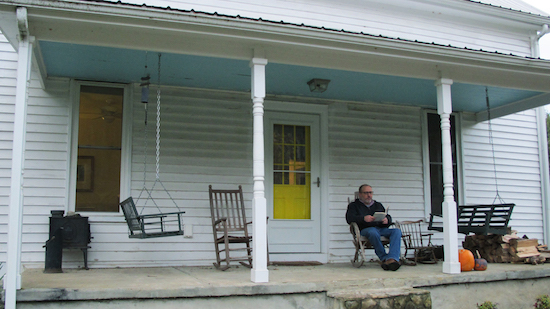
In 2001, his debut poetry collection, Lawrence Booth’s Book Of Visions, won the Yale Series Of Younger Poets Competition under feted writer WS Merwin. Between the prize and the amount of reading work he was then offered, he was able to put a down payment on the farm and 20 acres of land in Washington County where he lives now.
When I ask him if the house took some renovating before it was rendered habitable, he breaks out of sublime/serious poet mode and laughs uproariously before regaining his composure and adding: “Yes.”
He expands: “When I first bought the property almost 20 years ago, the old house was not habitable. No one had lived in it for years. The plaster couldn’t be salvaged, it was falling off the walls and there was old panelling up that had to be removed.
“I had to throw away old rugs that had been nailed down to the floors; I filled a large dumpster that was about 20 feet long, six feet deep and eight feet wide. It was dirty… dirty. There was seemingly endless work. I had to basically tear the interior of the house down to its basic structure.
“The house was from the 1840s. I had to put in insulation and drywall. I rewired the house. I put in basic plumbing. And all of that took three or four years of working whenever I could. I got it to where it was pretty comfortable… for me at least.”
Manning now shares the farmhouse with Amanda, his wife, and Lillian, their three-year-old daughter. His marriage was cause enough for him to reconsider to what extent the project was actually complete. He laughs: “When I first renovated the house, I wasn’t married, so my standards were low. When I got married Amanda said, ‘We’re going to have to do some upgrades.’ My work brought the house into the 20th Century and my wife wanted it brought into the 21st century. And we paid professionals to do that last bit.”
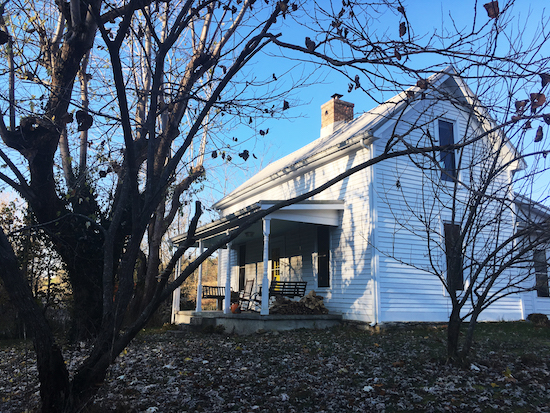
Even though it’s a difficult question to quantify, Manning doesn’t baulk when I ask him if this reconnection to the land has changed his writing: “I don’t want to claim this as something that all poets should do but I have come to believe that the poem begins in and belongs in the world. It’s in the natural world especially and my job and effort is simply to find the poem and bring a portion of it to the page.
“I don’t mean this to sound mystical but increasingly I have come to surrender the idea of my own authorship. I feel like the poem is already written from an aesthetic and metaphysical perspective and my effort is to go and be part of that poem and bring some portion of it with me and put it on the page.”
The poems might already (in some very metaphysical sense) be written and waiting in the wooded recesses of hickories, locusts and oak trees that surround his house to be found by him but that’s not to say the poetry is easy or that there isn’t a lot of other hard work to be done. Very soon he’s going to be transferring 75 tomato plants which he’s grown to the height of 7” indoors out into his garden. He just needs the soil temperature to come up by about one degree, which should happen any day now. He’s already tilled the garden patches, so they’re good to go as soon as it gets a little bit warmer.
Growing season is just starting now and lasts until October but this July is going to be the first year he and Amanda try canning and freezing excess vegetable produce to see them through the winter months. And on top of plucking poems out of the ether as he walks his plot and teaching two semesters at Transylvania University a year, that’s enough work to be getting on with.
He says: “I value making a divide between work and life. I want our home life to be what we do here on the farm as well as the work and the writing that is done here. I want there to be a connection that we’re making as a family to our little patch of land. I want that to be the source of the poems I write.”
After we’ve talked for about an hour, he has to sign off as it’ll soon be time for Lillian’s afternoon nap. Before logging out of Skype he concludes: “We belong to this place now and I hope we’re in a position to pass that onto our daughter. She will hopefully be the next generation. It might be a few years before I can be certain of this fact but I feel like I’m in the process of returning my family to this land. This process may not even be completed by the end of my life but this is the work that I have started.”
Railsplitter by Maurice Manning is published by Copper Canyon Press this Autumn

